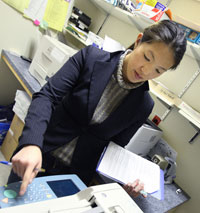Bourguignon Beat: Sustaina-what now?
Bourguignon Beat: Sustaina-what now? McGill University
User Tools (skip):
SUSTAINABILITY ISSUE
Sustaina-what now?
Audit unearths environmental faux pas but steps to improve are easy

NG: No environmental slight unnoticed
Sustainability in the workplace should not be a difficult objective to achieve. Shutting down computers at the end of the day, switching off lights, printing on both sides of the paper—all are no-brainers, right? Well, not necessarily.
In the interest of raising awareness of McGill’s Environmental Policy and the recommended steps for reducing the University’s environmental footprint, we in the Media Relations Office, publishers of the McGill Reporter, volunteered to submit to a sustainability audit.
Bad idea.
The moment McGill Sustainability Director Dennis Fortune and Environmental Officer Kathleen Ng walked through our door, clipboards in hand, we knew we were in for no easy ride. Nor were they. The Media Relations Office, and the Reporter office (affectionately known as “the Pit”), are hellish fire traps whose walls buckle from the weight of towering stacks of old newspapers and whose very essence warns would-be punters to stay away for fear of being devoured by the vortex of chaos and debris in which we happily work.
OK, no, it’s really not that bad. But we are journalists and creative types, after all, which means some of us lack the social and environmental graces to convincingly pull off anything even remotely resembling sustainability.
Which is why no one was warned ahead of time about the sustainability audit. When Fortune and Ng showed up, they had the element of surprise in their favour and we had the element of habit against us.
The result: we scored an embarrassing 37 percent (yes, that’s out of 100), based on a checklist of sustainability practices drawn up to help members of the McGill community employ—if not embrace—the tenets of the Environmental Policy.
“You have this beautiful window here and you could be harvesting the natural light instead of using fluorescent bulbs,” said Fortune, surveying a typically overlit office.
It turns out we’re not alone.
“We have entire classrooms where the lights are not turned off between classes,” said Fortune. “People don’t feel empowered to take steps like turning off lights [but] from an environmental standpoint, it’s incumbent on the entire McGill community to reduce energy use to the best of our ability.”
Harvesting? Empowered? These are not your everyday workplace words. But they are words worth learning and adopting, according to Fortune and Ng.
“People don’t realize that when you have a screensaver, it doesn’t actually save any energy. The screen goes down, but the computer doesn’t go down. We could save $51,000 per year on the 3,500 computers that are managed by ICS, just by turning to power-save mode.”
Fortune and Ng have been meeting with ICS officials to come up with across-the-board solutions, but in the meantime, they point out how easy it is for individual employees to do their part.
“Harvesting” natural light in offices equipped with windows is no more complicated than opening the blinds, for instance. Setting a computer to “hibernate” when not in use involves just a few simple steps and increases morning boot-up time by a mere few seconds—less time than it takes to brew a cup of coffee.
Fortune and Ng’s observations and recommendations are duly noted and we pledge to take the necessary steps to earn a higher sustainability score when they return to our overlit offices in a few months.
In fact, we’ve already started rethinking, reusing and recycling in a variety of small but meaningful ways: removing our fax number from the various ‘junk fax’ lists that clog the near-obsolete machine with worthless marketing messages every few minutes; buying sugar in bulk instead of individual sugar packets for coffee; ordering 100-percent recycled paper for printing and photocopying; turning off the lights in the kitchen area when the room is not in use. The list will grow in the weeks to come as we make a serious effort to become more sustainable.
These are all baby steps, yes, but easy steps anyone can and should take for the sake of sustainability.
Now if we can just work up the courage to tackle those towers of newspapers.

